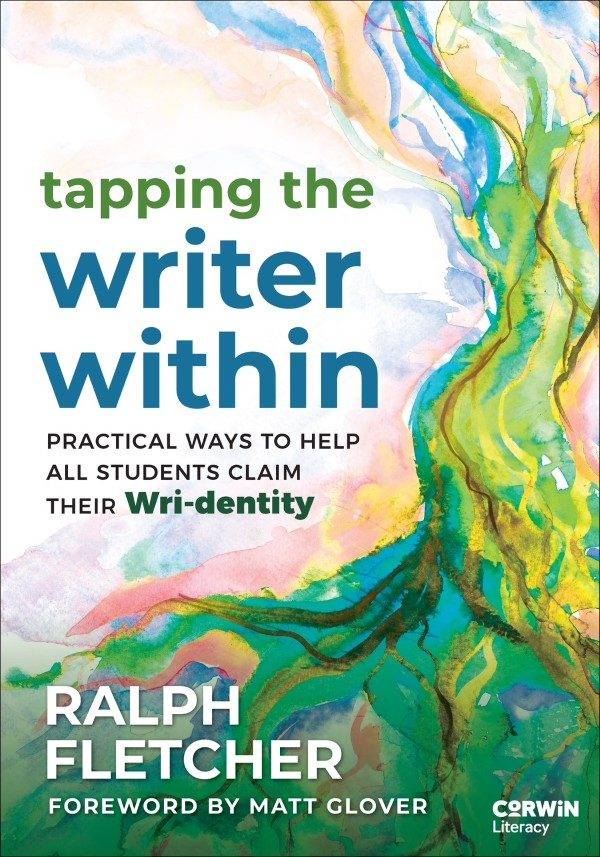
Tapping the Writer Within
Practical Ways to help all students claim their Wri-dentity
Help every student become an engaged, enthusiastic, and confident writer.
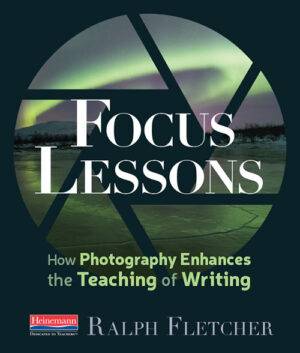 Focus Lessons
Focus Lessons
How Photography Enhances the Teaching of Writing
In Focus Lessons, Ralph Fletcher makes the link between writing and photography clear. He offers new ideas about taking pictures to spark creativity, using a camera as a writer’s notebook, learning to “read” images as mentor texts, and helping students develop writing from photos.
Book specs: 128 pages +2019 / Paperback / Grade Level: 4th – 12th
Heinemann: $21.00
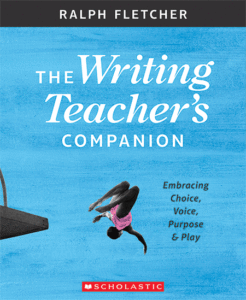 Boost writing instruction with an all-new resource from Ralph Fletcher!
Boost writing instruction with an all-new resource from Ralph Fletcher!
Celebrated author and educator Ralph Fletcher provides a practical and illuminating guide to writing workshop for both new and veteran teachers. The Writing Teacher’s Companion describes components of a successful workshop, as well as the best ways to get the workshop started and sustain it successfully across the school year. Fletcher, a wise and witty writing companion, shows us why encouraging choice, purpose, and play helps students find their voices and produce strong, effective writing.
Book specs: 176 pages + access to online videos featuring Ralph Fletcher.
Scholastic: $31.49.
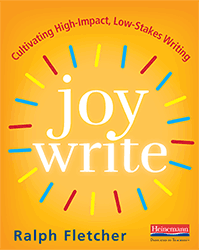 Joy Write: Cultivating High-Impact, Low-Stakes Writing
Joy Write: Cultivating High-Impact, Low-Stakes Writing
By Ralph Fletcher
Heinemann Educational Pubilshers. 18.00
Nothing helps writers grow like practice. But not just any kind of practice will do. You’ve got to bring the joy! In Joy Write, beloved writer and teacher Ralph Fletcher shows you how.
“A writer needs wide latitude so she can bring all her intelligence to the task,” Ralph observes. “Assigning a particular format—a hamburger essay, for instance—would curtail this play, if not eliminate it entirely.” That’s why, instead of teacher-driven assignments, Joy Write shares the whys and the how of giving students time and autonomy for the playful, low-stakes writing that leads to surprising, high-level growth.
First Ralph makes the case for carving out classroom time for low-stakes writing, despite pressure to focus on persuasive essays and test prep. Then he shares five big ideas for choice-driven, authentic, informal writing—deeply engaging work that kids want to do. He also provides numerous suggestions for helping students build and flex their writing muscles, increase their stamina, and develop passion for expressing themselves with the written word.
“We don’t teach students to write,” Ralph Fletcher advises, “so much as create a safe space where they can teach themselves by doing.” Trust Ralph and find out how to bring the joy to your writers.
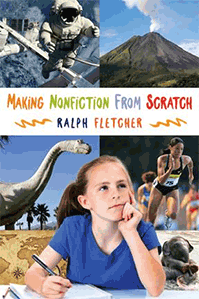 Making Nonfiction from Scratch
Making Nonfiction from Scratch
By Ralph Fletcher
Do you have students whose nonfiction writing is formulaic, devoid of energy and voice? In Making Nonfiction from Scratch bestselling PD and children’s book author Ralph Fletcher offers a candid critique of how nonfiction writing is often taught in schools and gives teachers the inspiration and strategies they need to help their students write authentic nonfiction.
Skilled nonfiction writers draw on strategies, techniques, and craft found in other genres: poetry, comedy, even mystery. Without those elements, nonfiction would be dry and dull. Making Nonfiction from Scratch helps bring all of those aspects together and shows how each genre can enrich nonfiction writing.
Ralph emphasizes the power of choice, mentor texts, and nonfiction read-alouds in making nonfiction an everyday part of classrooms. “Classroom Connection” sections throughout the book suggest immediate, practical strategies for putting the ideas in the book to use. Two case studies and a chapter on the dos and don’ts of nonfiction writing instruction round out this short, practical book.
Any informational writing should be insightful, accurate, and well organized – but it doesn’t have to be boring. Ralph invites you to make your classroom a place where students can create delicious nonfiction full of passion, voice, and insight.
$18.50
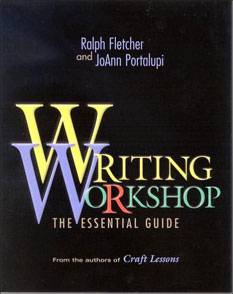 Writing Workshop, The Essential Guide
Writing Workshop, The Essential Guide
by Ralph Fletcher and JoAnn Portalupi
Heinemann
Is the writing workshop the only way to teach writing? No. There are a variety of approaches or programs, but none of them matches the writing workshop when it comes to growing strong writers. That’s why, despite the pressures of testing, the writing workshop has endured and even flourished in thousands of schools across the country.
WRITING WORKSHOP is a practical book that provides everything a teacher needs to get the writing workshop up and running. In clear language, Fletcher and Portalupi explain the simple principles that underlie the writing workshop, and explore all the major components that make it work. Each chapter addresses an essential element, then suggests five or six specific things a teacher can do to implement the idea under discussion. There’s a separate chapter entitled “What About The Skills?” which shows how to effectively teach skills in the context of writing. The book closes with practical forms in the appendices to ensure that the workshop runs smoothly.
$28.88
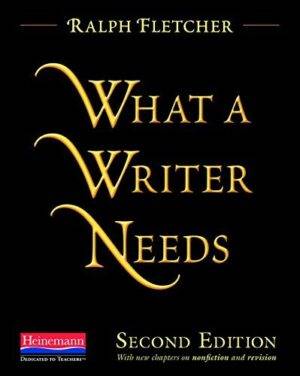 What A Writer Needs
What A Writer Needs
Ralph Fletcher
Second Edition
published by Heinemann
$23
In What A Writer Needs, Ralph presents a crash course on the elements of writing, with chapters on how to create vivid details, compelling voice, a sense of place, believable characters, tension, engaging leads and endings, just to name a few. Readers will develop a deeper, more profound knowledge of writing and will find the book eminently practical as well. In fact, Ralph has added two entirely new chapters on revision and nonfiction writing that are immediately useful for meeting Common Core writing standards. It also includes a completely updated list of suggested mentor texts, handpicked by Ralph, and sorted by the craft element each demonstrates.
Reviews:
“What a Writer Needs is beautifully written and will move readers to become better writers and better writing teachers!”
—Gail Boushey and Joan Moser, authors of The Daily 5
“I truly feel my work is grounded in the fundamental ideas I learned from What a Writer Needs. Reading the second edition, I realize it’s as relevant today as it was then.”
—Katie Wood Ray, author of About the Authors
“Ralph has accomplished the unthinkable—he somehow managed to improve a perfect book! With the addition of a chapter on nonfiction and another on revision, he’s given us exactly what every writer needs—all over again.”
—Ruth Culham, author of 6+1 Traits of Writing
“Since we cannot bring Ralph home with us to help us write our own stories or help us teach our students to write theirs, we are fortunate enough to have the next best thing—this book. For that, and for Ralph Fletcher, for his books, his stories about his family, the joy that shines through on every page of this book. I am very grateful and a better teacher to boot.”
—Jim Burke, author of The English Teacher’s Companion
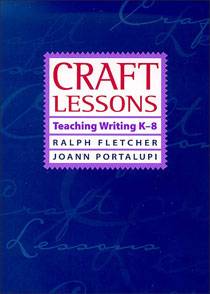 Craft Lessons: Teaching Writing K-8
Craft Lessons: Teaching Writing K-8
Second Edition
by Ralph Fletcher and JoAnn Portalupi
Craft Lessons has become a mainstay of writing teachers, both new and experienced. Readers value. Readers value the pithy, practical lessons—each printed on one page—and appreciate the instructional language geared to three grade-level groupings: K–2, 3–4, and 5–8.
In the decade since Craft Lessons‘ publication the world has changed in many ways, yet one thing has remained constant: teachers continue to feel starved for time. With new curriculum mandates, daily specials, “pull-outs,” and precious time devoted to test preparation, the situation has never been worse, and the need for a succinct resource like Craft Lessons has never been greater.
The features that made Craft Lessons so valuable have been augmented in this new edition which includes:
- Seventeen brand new craft lessons.
- Revisions to other craft lessons: model texts that have gone out of print have been replaced with current titles, and the resource materials sections have been expanded.
- Two new indexes: a handy subject index to make it easier to find specific craft lessons, and an index that shows how these craft lessons can be integrated into Ralph and JoAnn’s curriculum resource, Teaching the Qualities of Writing.
- New thinking about teaching elements of craft and the reading-writing connection.
The 95 lessons in this book provide a wealth of information for teaching leads, character, endings, stronger verbs, and much more. This new edition reestablishes Craft Lessons as the crucial “desert island book” for harried writing teachers everywhere.
 Nonfiction Craft Lessons
Nonfiction Craft Lessons
Teaching Information Writing K-8
by Ralph Fetcher and JoAnn Portalupi
Most young writers are not intimidated by personal narrative, fiction, or even poetry, but when they try to put together a “teaching book,” report, or persuasive essay, they often feel anxious or frustrated. JoAnn Portalupi and Ralph Fletcher believe that young nonfiction writers supply plenty of passion, keen interest and wonder. Teachers can provide concrete strategies to help students scaffold their ideas as they write in this challenging genre. Nonfiction Craft Lessons will help students breathe voice into lifeless nonfiction writing, make it clearer, more authoritative, and more organized. This is an invaluable counterpart to the best-selling Craft Lessons.
 Breathing In, Breathing Out
Breathing In, Breathing Out
Keeping a Writer’s Notebook
by Ralph Fletcher
Heinemann
This book is for any adult who has a writer inside of them, however lost or buried. It explores the notebook as a place to react, play through language trough “set pieces”, write badly, collect seed ideas, snatches of conversation and more.
$26.82
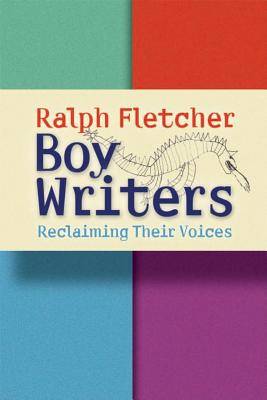 Boy Writers: Reclaiming Their Voices
Boy Writers: Reclaiming Their Voices
Ralph Fletcher
Stenhouse
Writing test scores indicate that boys have fallen far behind girls across the grades. In general, boys don’t enjoy writing as much as girls. What’s wrong? How can we do a better of job of creating “boy-friendly” classrooms so their voices can be heard?
In Boy Writers: Reclaiming Their Voices Ralph Fletcher draws upon his years of experience as staff developer, children’s book author, and father of four boys. He also taps the insights from dozens of writing teachers around the US and abroad. Boy Writers asks teachers to imagine the writing classroom from a boy’s perspective, and consider specific steps we might take to create stimulating classrooms for boys.
Topic choice emerges as a crucial issue. The subjects many boys like to write about (war, weapons, outlandish fiction, zany or bathroom humor) often do not get a warm reception from teachers. Ralph argues that we must “widen the circle” and give boys more choice if we want to engage them as writers. How? We must begin by recognizing boys and the world in which they live. Boy Writers explores important questions such as:
- What subjects are boy writers passionate about, and what motivates them as writers?
- Why do boys like to incorporate violence into their stories, and how much should be allowed?
- Why do we so often misread and misunderstand the humor boys include in their stories?
In addition, the book looks at: how handwriting can hamstring boy writers, and how drawing may help; welcoming boy-friendly writing genres in our classrooms; ways to improve our conferring with boys; and more.
Each chapter begins with a thorough discussion of a topic and ends with a highly practical section titled: “What can I do in my classroom?” Boy Writers does not advocate promoting the interests of boys at the expense of girls. Rather, it argues that developing sensitivity to the unique facets of boy writers will help teachers better address the needs of all their students.
$20.00 Paperback
 Pyrotechnics on the Page
Pyrotechnics on the Page
Playful Craft That Sparks Writing
Ralph Fletcher
With Pyrotechnics on the Page, Ralph is poised to teach so many of us once again in a whole new way, and we’re going to have a grand ‘ole time learning what it is he wants to teach us about playing with language.
Katie Wood Ray, from Foreword
Writers in every field play with words each time they sit down at their desks.
In his newest book, Ralph Fletcher demonstrates how playful craft can energize student writing and breathe new energy into the writing workshop.
Children have a natural affinity for language play Pyrotechnics on the Page demonstrates how writing teachers can tap into it. This book provides a wealth of resources for teachers:
* Information on the roots and developmental importance of language play;
* A how-to on using the writer’s notebook as a playground for students to explore and experiment with verbal pyrotechnics;
* An in-depth look at the kind of language play commonly used by writers, including chapters on Puns and Double Meanings, Idioms and Expressions, Inventing Words, and Harnessing the Supple Power of Sentences (these chapters end with a “Bringing It to the Writing Workshop” section that includes explicit classroom connections);
* Twenty-four brand new craft lessons to bring pyrotechnics into the classroom
* An extensive bibliography of relevant mentor texts that make it easy to model language play for students
Pyrotechnics on the Page is vintage Fletcher: personal, anecdotal, and practical. It represents the latest chapter in Ralph’s efforts to widen the circle in the writing classroom, make it a more engaging place for student writers and, in the process, lift the quality of their writing.
 Walking Trees: Portraits of Teachers and Children in the Culture of Schools
Walking Trees: Portraits of Teachers and Children in the Culture of Schools
by Ralph Fletcher
One September, Ralph Fletcher began a job teaching veteran New York City public school teachers how to teach writing to their students. The characters Fletcher worked with are unforgettable, as are their stories, in this rich narrative that reads like a novel.
$34.50